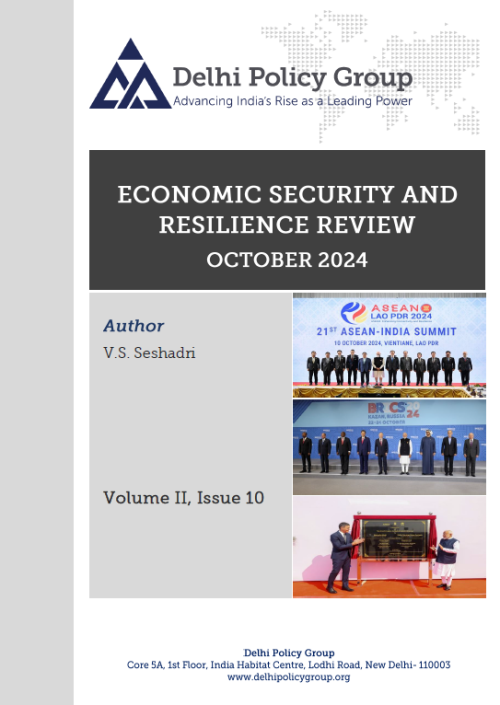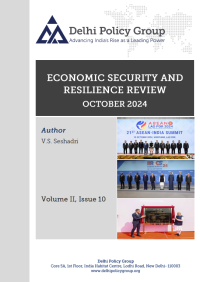Economic Security and Resilience Review
Date: November 04, 2024
This month’s ESRR looks at the outcomes relevant to economic security emerging from the XVI BRICS Summit held in Kazan, Russia on October 22-24, 2024. BRICS leaders voiced strong concern on unilateral sanctions being imposed by some developed countries and signalled greater efforts to promote use of local currencies in international transactions, as well as to establish independent cross border settlement and depositary infrastructure. While the BRICS declaration also underlined the importance of cooperation in strengthening supply chains, there was no specific initiative in that direction.
This issue also draws attention to the joint statement issued by India and ASEAN on advancing digital transformation following the ASEAN-India summit held in Vientiane, Laos on October 10, 2024. Efforts are also underway to establish cross border linkages between payment systems in ASEAN and India.
Meanwhile, the ASEAN summit held on October 9 adopted a declaration on supply chain connectivity, as part of putting together a Framework on ASEAN Supply Chain Efficiency and Resilience.
The sixth India-US Commercial Dialogue held in Washington DC on October 2, 2024 resulted in the signing of an MOU on critical minerals supply chains, and reviewed ongoing cooperation on semiconductors, IPEF, energy and innovation start-ups.
Two European leaders visited India during the month - German Chancellor Olaf Scholz and Spanish Prime Minister Pedro Sanchez. The signing of a Indo-German Green Hydrogen Roadmap, and a joint declaration to boost R&D in Advanced Materials, were among the highlights of the Scholz visit. The Spanish PM’s visit included the inauguration of a Final Assembly Line Plant of C-295 aircraft at Vadodara.
The visit of Nvidia CEO Jensen Huang for the Nvidia-India AI summit highlighted India’s potential to be a significant manufacturer of AI.
Finally, this report also covers trade remedial measures taken by different countries during the month. India imposed anti-dumping duties on certain imports from China. The US imposed preliminary duties on the imports of solar panels from four South East Asian countries on the ground that they were circumventing existing trade remedy measures on Chinese exports of cells. The European Union decided by a majority vote to impose countervailing duties on electric vehicle imports from China, leading to retaliatory measures by China.
To read this issue of the ESRR, Vol. II, Issue 10, please see the PDF attached
This issue also draws attention to the joint statement issued by India and ASEAN on advancing digital transformation following the ASEAN-India summit held in Vientiane, Laos on October 10, 2024. Efforts are also underway to establish cross border linkages between payment systems in ASEAN and India.
Meanwhile, the ASEAN summit held on October 9 adopted a declaration on supply chain connectivity, as part of putting together a Framework on ASEAN Supply Chain Efficiency and Resilience.
The sixth India-US Commercial Dialogue held in Washington DC on October 2, 2024 resulted in the signing of an MOU on critical minerals supply chains, and reviewed ongoing cooperation on semiconductors, IPEF, energy and innovation start-ups.
Two European leaders visited India during the month - German Chancellor Olaf Scholz and Spanish Prime Minister Pedro Sanchez. The signing of a Indo-German Green Hydrogen Roadmap, and a joint declaration to boost R&D in Advanced Materials, were among the highlights of the Scholz visit. The Spanish PM’s visit included the inauguration of a Final Assembly Line Plant of C-295 aircraft at Vadodara.
The visit of Nvidia CEO Jensen Huang for the Nvidia-India AI summit highlighted India’s potential to be a significant manufacturer of AI.
Finally, this report also covers trade remedial measures taken by different countries during the month. India imposed anti-dumping duties on certain imports from China. The US imposed preliminary duties on the imports of solar panels from four South East Asian countries on the ground that they were circumventing existing trade remedy measures on Chinese exports of cells. The European Union decided by a majority vote to impose countervailing duties on electric vehicle imports from China, leading to retaliatory measures by China.
To read this issue of the ESRR, Vol. II, Issue 10, please see the PDF attached



